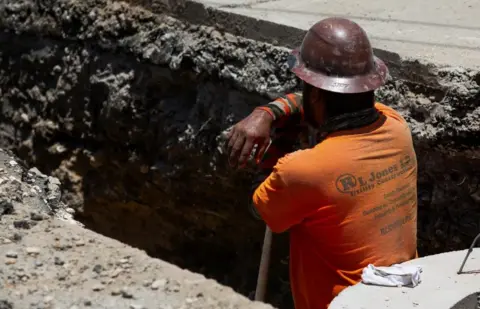Pregnant, living in a car, and battling a Texas heatwave
Record-setting temperatures throughout the southern US have placed nearly 90 million people under excessive heat alerts. For some, there's no escape from the dangerously oppressive temperatures, Angelica Casas reports from San Antonio, Texas.
Power use in Texas hit an all-time high on Tuesday, as people with air conditioning gratefully took refuge from the heat.
That record was set to be beaten again on Wednesday. The Texas power authority has asked residents to cut back on electricity use, but assured them blackouts will be avoided.
Not everyone has the option to seek the cool indoors, however.
Bella De La Cruz has been living out of her vehicle with her one-year-old son since quitting her job at a restaurant because she couldn't find reliable childcare. She's also four months pregnant.
"I drive around looking for where to park in the shade until it's night-time and then I look for where to park for us to sleep," she said.
During the day, the San Antonio mother has been selling cups of chopped fruit while she continues to look for childcare and work.
The heat has exacerbated their precarious living situation.
"During the night I turn the car on every 30 minutes to stay fresh," she said. "I can't leave the windows down because of homeless people or strangers or the mosquitos that get in the car."
Across town, construction worker Miguel Carrillo is working an outdoor job under the blazing sun.
He wears long sleeve shirts with hoods and a face shield to protect himself from the sun, though that can only do so much, he says.
"You definitely feel it, especially from midday through the afternoon," he said. "Unfortunately this job cannot be done indoors. The city keeps growing and people need homes - that's where my job comes in."
Carrillo urges others who need to be outdoors to take breaks and drink lots of water.
"Don't try to tough it out because that sun can mess you up bad," he said. "I've seen it first-hand."
 Reuters
ReutersAccording to the Centers for Disease Control and Prevention, more than 600 people are killed by extreme heat in the US ever year.
In Webb County, along Texas' southern border, at least nine people have died due to heat-related illnesses, according to the county's medical examiner. And in Austin, city officials say paramedics have responded to more than 100 heat-related incidents the past two weeks alone.
The current scorching weather is the work of a heat dome - a weather event which occurs every couple of years in the region. It happens when high pressure is trapped in one area because of wind patterns. It's called a dome because it reaches high into the atmosphere upwards of 5 to 10 miles (8 to 16km) in altitude, and stretches horizontally for several hundreds or even thousands of miles.
"It's fairly common to have a heat dome in place somewhere at any given time during the summer," said John Nielsen-Gammon, a professor of atmospheric sciences at Texas A&M University. "In Texas we get one to produce very hot weather every couple of years."
Mr Nielsen-Gammon, a climatologist for the state, says that while the heat dome will subside over the next couple of days and expand towards the northeast, it will lead to higher temperatures for the region throughout the rest of summer.
"It has accelerated the drying out of the ground," he said. "Typically, temperatures increase as the ground gets dryer, but this will lead to even warmer temperatures in July and August than we might have had otherwise."
The effects on the region could be severe, especially for natural environments and people with high exposure to the heat.
"Plants aren't getting the moisture they need so we're starting to see stress in crops and an increasing risk of wildfires," Mr Nielsen-Gammon said.
"The longer it goes on, the greater health risks there are for people with no air conditioning as well."
